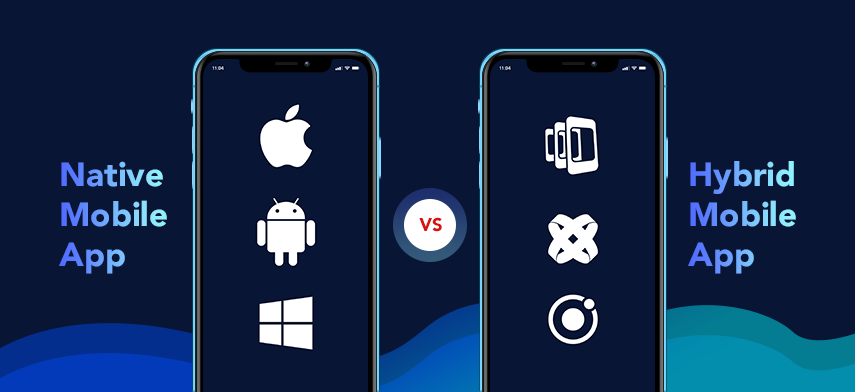What’s the Difference Between Native and Hybrid Apps?

In today’s digital-first world, mobile applications have become the backbone of customer engagement, business growth, and digital transformation. Companies across industries—from e-commerce to healthcare—are investing in mobile solutions to stay relevant and competitive. However, one of the most crucial decisions businesses face when developing an app is choosing between native apps and hybrid apps.
As a leading mobile app development company in South Africa, Devherds specializes in helping businesses understand the technical and strategic implications of this choice. In this article, we’ll explore the key differences between native and hybrid apps, their pros and cons, and how businesses can make the right decision.
Understanding Native Apps
Native apps are mobile applications built specifically for one platform—either iOS or Android—using programming languages and tools supported by that platform. For example:
-
iOS native apps are developed using Swift or Objective-C.
-
Android native apps are developed using Java or Kotlin.
Since they are platform-specific, native apps can take full advantage of the device’s hardware, features, and operating system capabilities.
Advantages of Native Apps
-
High Performance
Native apps deliver faster performance and smoother user experiences because they are optimized for a particular platform. Tasks like rendering animations, accessing GPS, or using the camera work seamlessly. -
Better User Experience (UX)
They align closely with platform-specific UI/UX guidelines, giving users a familiar and intuitive interface. This results in higher engagement and customer satisfaction. -
Access to Full Device Features
From push notifications to biometric authentication and advanced sensors, native apps can fully leverage all the capabilities of smartphones. -
Scalability and Security
Native apps offer greater stability, scalability, and stronger security measures. For businesses in industries like banking or healthcare, this level of security is essential.
Disadvantages of Native Apps
-
Higher Development Cost
Since each platform requires its own codebase, developing separate apps for iOS and Android doubles the cost. -
Longer Development Time
Building two apps in parallel takes significantly more time compared to developing one hybrid app.
Understanding Hybrid Apps
Hybrid apps combine the best of both worlds—web and mobile. They are built using web technologies like HTML, CSS, and JavaScript, and then wrapped in a container to run on multiple platforms (iOS and Android) with a single codebase. Popular frameworks for hybrid apps include React Native, Flutter, and Ionic.
Advantages of Hybrid Apps
-
Cost-Effective Development
Businesses only need to create one codebase that runs across multiple platforms. This reduces cost and effort significantly. -
Faster Time-to-Market
Hybrid apps can be developed and deployed much faster, making them ideal for startups or businesses with tight deadlines. -
Easier Maintenance
With a single codebase, updates and bug fixes are easier to implement compared to native apps that require changes in two separate systems. -
Good Enough Performance for Many Use Cases
While they may not match native apps in performance, hybrid apps are more than sufficient for e-commerce platforms, content apps, and service apps that don’t rely heavily on device hardware.
Disadvantages of Hybrid Apps
-
Lower Performance
Hybrid apps may experience lagging or reduced performance, especially for complex apps with heavy animations or advanced graphics. -
Limited Access to Device Features
Although frameworks bridge many gaps, hybrid apps still lack the deep integration native apps enjoy with device hardware. -
UI/UX Limitations
Since hybrid apps rely on a single design for multiple platforms, they may not always provide the most seamless experience for platform-specific users.
Native vs. Hybrid Apps: A Direct Comparison
| Feature | Native Apps | Hybrid Apps |
|---|---|---|
| Platform | Platform-specific (iOS or Android) | Cross-platform (iOS + Android) |
| Performance | High, optimized for platform | Moderate, depends on framework |
| Cost | Higher (two codebases) | Lower (single codebase) |
| Time to Market | Longer | Faster |
| User Experience | Excellent, platform-consistent | Good, but less polished |
| Device Feature Access | Full access | Partial access |
| Maintenance | Complex, separate updates | Easier, single update |
| Best For | High-performance apps like gaming, banking, healthcare | Startups, e-commerce, simple business apps |
Which One Should Businesses Choose?
The decision between native and hybrid apps depends on a business’s budget, goals, and target audience.
-
Choose Native Apps if:
Your business requires top performance, advanced features, or serves industries like healthcare, banking, or gaming, where security and user experience are critical. -
Choose Hybrid Apps if:
You need a cost-effective solution, a faster launch, and your app is focused on content delivery, e-commerce, or basic customer engagement.
Why Partner with Devherds in South Africa?
Choosing the right development partner is as important as choosing between native and hybrid apps. Devherds, a trusted mobile app development company in South Africa, offers expertise in both approaches.
What Makes Devherds Stand Out?
-
Customized Solutions
We assess each client’s business needs, goals, and budget before recommending native or hybrid development. -
End-to-End Development
From idea validation and UI/UX design to coding, testing, and deployment, Devherds provides a complete app development lifecycle. -
Expertise in Latest Frameworks
Whether it’s Swift for native iOS apps or Flutter for cross-platform apps, our team ensures cutting-edge development practices. -
Focus on Scalability and Security
Our solutions are built to grow with your business while maintaining the highest security standards. -
Proven Industry Experience
Devherds has worked with businesses in healthcare, logistics, retail, and fintech across South Africa, delivering apps that drive measurable results.
Real-World Use Cases
-
Native App Example: A South African bank that requires secure, fast, and reliable apps for mobile banking would benefit from native apps.
-
Hybrid App Example: A startup launching a grocery delivery service across South Africa could save time and costs by choosing a hybrid app to reach customers on both iOS and Android simultaneously.
Conclusion
The debate between native and hybrid apps is not about which one is better universally—it’s about which one fits your business model, goals, and customer expectations. Native apps offer superior performance and user experience, while hybrid apps provide cost efficiency and speed.
Partnering with a reliable mobile app development company in South Africa like Devherds ensures that businesses receive tailored guidance and robust development solutions. Whether you’re a startup looking to launch quickly or an enterprise requiring advanced functionality, Devherds can help you choose the right path and build a mobile app that delivers real value.







